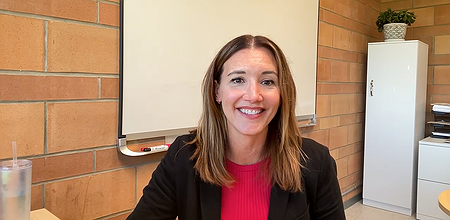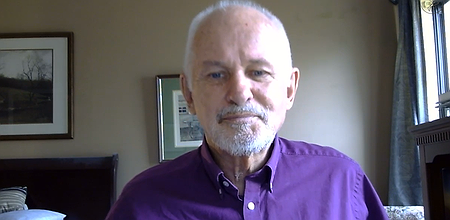- Develop a comprehensive understanding of the symptoms associated with eating disorders
- Conduct thorough and effective evaluations of individuals presenting with eating disorders
- Apply targeted, evidence-based interventions to address the specific symptoms of eating disorders
A comprehensive guide to treating eating disorders with CBT
Jenna Jones, Social Worker, Psychotherapist
Clinical strategies to rebuild positive self-perception and nurture healthy behaviors
Excerpt:
- 4h of continuing education
- 33 lessons that last from 5 to 15 minutes each
- 1 certificate of achievement
- 1 PowerPoint
- 1 bibliography
- 1 course evaluation
- 7-day money back guarantee
- Unlimited access
- 97% of participants who completed the satisfaction survey declare they would recommend this course to a colleague
Overview
Eating disorders extend far beyond food; they are coping mechanisms rooted in deeper emotional or psychological challenges. In psychotherapy, the goal is not merely to eliminate disordered eating behaviors, but to understand and address the reasons behind them. To help clinicians provide the best possible care, Jenna Jones—a psychotherapist specializing in eating disorder treatment—has created an immersive, hands-on workshop. This training equips participants with specialized assessment tools and therapeutic strategies for effectively supporting individuals with eating disorders.
In this workshop, you’ll learn to integrate eating-disorder-specific approaches at every stage of intervention, from initial screening and evaluation to the implementation of tailored interventions in practice. Participants will gain a thorough understanding of the various types of eating disorders, their distinct clinical presentations, and the nuanced strategies required to address them. Through detailed, evidence-based instruction, attendees will explore the intricate relationship between disordered eating symptoms, emotions, food, body image, thought processes, and interpersonal relationships. The workshop also emphasizes relevant terminology and clinical language, helping clinicians communicate more effectively and compassionately with this population.
Central to the workshop is the application of Cognitive Behavioral Therapy (CBT) for clinical interventions. You will also be introduced to complementary therapeutic modalities—including Dialectical Behavior Therapy (DBT), Motivational Interviewing, Acceptance and Commitment Therapy (ACT), Mindful Self-Compassion Theory, Shame Resilience Theory, and Family Systems Theory—and learn how these additional approaches can enhance the effectiveness of CBT, particularly in addressing the complex emotional, cognitive, and relational dynamics often present in individuals with eating disorders.
Accreditation
Collège des médecins du Québec
For physicians who practice psychotherapy, training recognized by the Ordre des psychologues du Québec is automatically considered as activities adopted by the Collège des médecins, in accordance with Article 3 of the Regulation.
For physicians who do not practice psychotherapy, the College evaluates each recognition request based on the following criteria:
- the relevance of the activity to the practice of the profession
- the skills and experience of the trainer
- the quality of the content and its adequacy with the physician's practice
- the pedagogical framework of the activity
- the quality of the documentation provided
- compliance with the training objectives set out in the regulation
- the presence of a certificate of participation or an evaluation
About the expert

Jenna Jones is a social worker and psychotherapist. In 2016, she graduated from McGill University with a Master’s Degree in Social Work, and has been involved in the field of eating disorders ever since. To date, she has worked with well over 1000 eating disorder clients. As a clinician, she has experience in psychiatric hospitals, inpatient units, day programs and outpatient programs.
She has provided individual therapy, couples therapy as well as family therapy, and has led a wide range of eating disorder groups. She also had the pleasure to supervise and train eating disorder interns. She is absolutely passionate about eating disorder recovery therapy.
Learning objectives
Learning material
A theoretical course illustrated with clinical examples. This course is composed of videos of 5 to 15 minutes each. The PowerPoint of the course to download.
Syllabus
- PowerPoint
- 1. Introduction
-
Defining and Understanding Eating Disorder
- 2. Eating Disorder Definitions
- 3. Case Scenario
- 4. Eating Disorders- Little to Do with Eating
- 5. Goal of Eating Disorder Recovery
- 6. Physical Safety and Language Used
- 7. Evaluation
- 8. Stages of Change
-
Food
- 9. Establishing the Link Between Eating Disorder and Emotions
- 10. Regulate the Emotions
- 11. How to Work with Functional and Dysfunctional Emotions
-
Emotions
- 12. The Set Point Theory and Cognitive Restriction
- 13. The Symptom Checklist
- 14. Meal Plan
- 15. Food Journal, Goals, and Sample Sessions
-
Body Image
- 16. Let's Talk About Weight
- 17. BMI and Weighing Exercises
- 18. Body Image Language
- 19. Body Image Exercises Part I
- 20. Body Image Exercises Part II
-
Thoughts
- 21. Cognitive Distortions
- 22. CBT Thought Record Worksheet
- 23. The Critical Voice
- 24. Self-Compassion
- 25. Perfectionism
- 26. Different Ways of Thinking
-
Relationships
- 27. The Impact of Society on Body Image
- 28. Cultural Expectations
- 29. Shame and Unwanted Traits
- 30. Authentic Self vs Cultural Expectations
- 31. Can I Be Average
- 32. Family System Stressors and Relationships Contracts
- 33. Conclusion
- Bibliography
CE Credits
Download a certificate of successful completion.
Audience
This training is intended for mental health professionals.
Your comments
"Jenna is extremely knowledgeable. She explained everything very well an gave good examples throughout the training" (automatically translated)
A social worker
"I enjoyed that the course allowed me to set my own pace. I also enjoyed the analogies and examples used by the instructor" (automatically translated)
A psychotherapist
"Excellent, very much appreciated" (automatically translated)
A social worker
"This was perhaps one of the best courses I have taken whether online or in person! The speaker was extremely well organised, thorough and also provided very helpful slides.
Excellent all around!" (automatically translated)
A psychologist
Registration
Ask a question
Do you have a question? Then email us at contact@asadis.net
Frequently asked questions
-
Is there an evaluation at the end of the course?
To validate the achievement of the learning objectives, a final evaluation in the form of true/false questions is required. It must be completed in order to obtain the certificate of completion.
In addition, an optional self-assessment is offered at the beginning and end of the course, allowing you to measure your progress on the targeted skills.
These evaluations are not graded and are intended primarily to support your professional reflection.
-
I have a disability. Can I receive specific support?
Yes! This training is offered as a pre-recorded video format, without subtitles. If you have a disability, we can provide an adapted alternative (technical assistance for viewing or individual supervision). For any request, please contact our disability coordinator at the following address: contact@asadis.net
-
How long do I have access to the course?
After your registration, the course is accessible anytime and from anywhere with unlimited access.
-
When does the course start?
That is entirely up to you! When you buy a course, you'll receive an access link that you can activate when you want.
-
Is there a student rate?
Yes there is! To learn more, email us at contact@asadis.net.
You may also be interested in:
Legal notice
The courses offered by ASADIS are accredited by different professional organisations. In addition, ASADIS is approved by the Canadian Psychological Association to offer continuing education for psychologists. ASADIS maintains responsibility for the program.
The CPA’s approval of an individual, group, or organization as a CE Sponsor or Provider is restricted to the activities described in the approved application or annual report form. The CPA’s approval does not extend to any other CE activity the Sponsor or Provider might offer. In granting its approval, the CPA assumes no legal or financial obligations to Sponsors, Providers, or to those individuals who might participate in a Sponsor or Provider’s CE activities or programs. Further, responsibility for the content, provision, and delivery of any CE activity approved by the CPA remains that of the CE Sponsor or Provider. The CPA disclaims all legal liability associated with the content, provision, and delivery of the approved CE activity.






